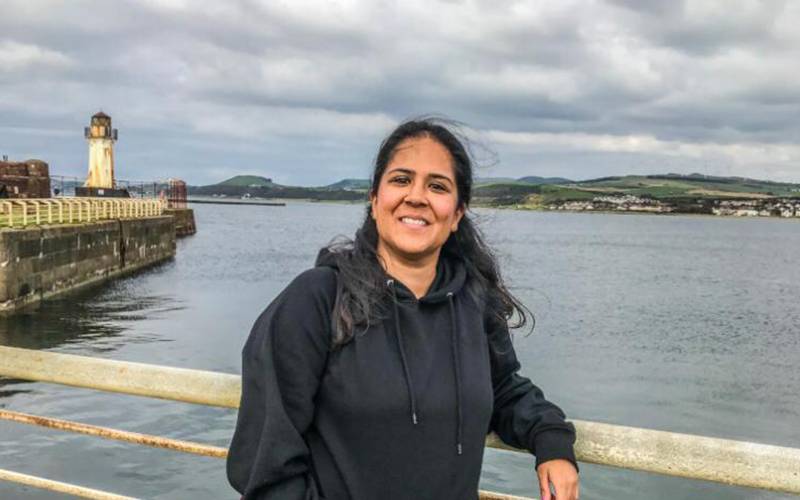This month we speak to Roshnee Patel to find out more about her role as a CAPE Policy Fellow and how her work is improving the health of the public

What is your role and what does it involve?
I am a CAPE Policy Fellow, seconded to the Public Policy Team (Office of the Vice Provost - Research, Innovation and Global Engagement) from the Ministry of Justice where I am a Senior Civil Servant in the Policy and Strategy Group. I’ve been seconded here for up to 12 months and started my post in March this year.
My role is three-fold – firstly to learn more from different parts of UCL and the diversity of thought offered here in order to ensure that I am keeping current and therefore challenging my thinking about policy solutions to complex social welfare legal needs. This includes keeping that learning ‘live’ and transferable by hosting sessions with the Ministry of Justice on a regular basis so this can be shared more widely. Secondly, hosting sessions across UCL to share my expertise and experience of being a Senior Civil Servant in central Government which includes the reality of the policy process and decision making, ways of working in the centre of Government and how to get the best from academic and policy profession relationships. Lastly, I am making the space and time to think more carefully about how policymakers can become more holistic in their approach to tackling social inequalities to promote better access to justice for all.
How are you improving the health of the public?
My area of interest is social welfare and justice. There are a huge number of people with employment, debt, housing, or immigration issues but these often require navigating the law to understand and enforce your rights which is a complex and confusing process. This can often lead to disengagement with the justice system until crisis point, health issues (i.e., stress or anxiety) and negative outcomes in resolving the issue. This cohort of high legal needs often correlates with a population that has negative health outcomes and, therefore, there is a huge benefit to health outcomes if legal needs can be addressed. I want to give some thought and time to how we can develop a framework or tool to help policy makers think more holistically about resolving social welfare legal needs against wider factors before developing solutions. If anyone has an interest in this area – I would really like to hear from you.
What do you find most interesting or enjoyable about your work?
The learning journey and opportunity to meet so many interesting and distinguished experts. I enjoy having the space to think more creatively and reflectively about social welfare and legal need challenges of vulnerable people and how we can better support this cohort with support services in Government (and beyond).
How have cross-disciplinary collaborations shaped your research?
I am a firm believer that two heads are always better than one (a first hand and personal experience after working as part of a job-share in my last post). As a policy professional in Government, my role has often involved drawing together different expertise in order to take a rounded view of what solutions exist to problems that can be offered to Ministers for a decision. I would work with strategic finance, digital colleagues, communication experts, lawyers, analysts, other Government departments and external stakeholders such as MPs or academics on a daily basis. I don’t think any of the complex issues we see in society today can be solved by a single expert. My default approach is always a multi-disciplinary and collaborative one.
What advice would you offer to others interested in developing cross-disciplinary research?
Be open-minded – try working with areas or colleagues that you might not instinctively assume would add value to your work or research. This includes understanding your own strengths and shadows and what skills or expertise you and your work can benefit from. Agree to disagree – valuing the diversity of thought which makes for better research, outcomes and decision-making also means knowing how to disagree well – you shouldn’t just approach people who agree with you, otherwise, it will just be an echo chamber where nothing really challenges your thinking to adapt and evolve. Learning never stops – therefore treat this as part of that learning journey whether it is in a small or big way - enjoy it!
What's next on the research horizon for you?
I suspect it will be back to the Ministry of Justice to make some waves with what I have learnt here at UCL! I am hoping that this secondment opportunity will be a rolling one, and so someone else will be seconded after me to keep going with the continuous learning approach.
If you could make one change in the world today, what would it be?
What a difficult question! I think it would be to rid the world of discrimination. In the Ministry of Justice, I continue to have a role as a Race Champion - mainly to advocate, challenge the status quo and be an ally for people who experience negative treatment due to their ethnic background and/or race. I know this is still very much a live issue for so many people here and around the world. What a better place it would be if this was no longer the case.
 Close
Close

